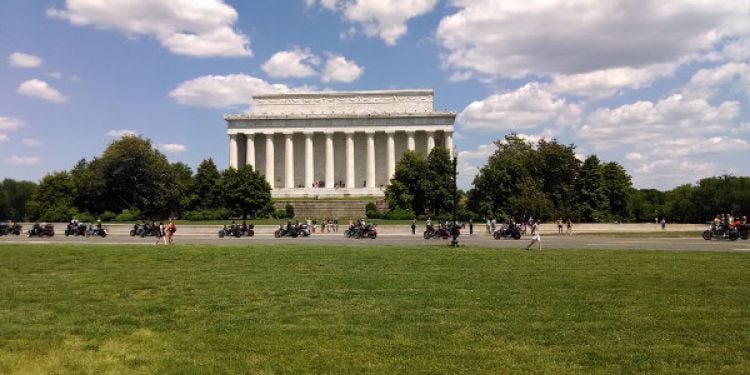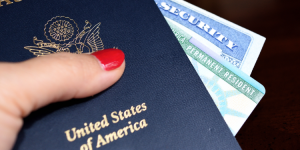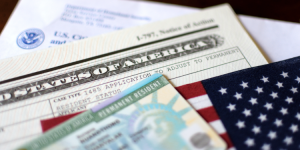
Where are you from, John, and what are you doing nowadays?
I was born in southern France where I was a high school student until I came to the United States to go to college. I have held several jobs in the U.S., starting out as a farm worker while in college, then working as a paralegal for five years in three different law firms before moving on to a career in public safety. I became a firefighter/EMT before being promoted to fire investigator, and I now work as a police officer in Washington D.C.
Why did you choose to move to the US?
The reasons of my expatriation to the United States aren't entirely clear to me. It's possible that being raised by Italian grandparents who were themselves immigrants in France influenced me, or perhaps for a much more pedestrian reason such as watching too many American dramas on TV, or even maybe for more poetic reasons such as having grown up in a "mid-sized port, established at the end of a gulf...in this place where I would have liked to be born" as written by Paul Valery, a writer born in my hometown of Sète.
The idea of seeing the world was ever present in my mind since the time when I was a little boy. I was a fan of geographical maps, travel accounts, exotic discoveries, I loved wandering around the port, fascinated by cargo ships with exotic names and bearing the flags of faraway countries. I was intensely attracted by the sea. I developed an interest in the United Stated and traveled there for the first time when I was fourteen years old. I instantly felt at home here and the idea of moving here became firmly rooted in my mind. I turned my dream into reality when I turned eighteen.
What were the procedures to follow for a French national to move there?

The immigration procedures to obtain permanent residence in the United States do not vary so much due to your national origin, save for limited exceptions, but rather according to your education, abilities or having close relatives in the U.S. My personal immigration journey to the U.S. started when I came here as an exchange student with a J-1 visa attending high school. I then obtained an F-1 student visa to attend college. After graduating from college, I obtained an H-1b professional worker visa via my employer who then sponsored me for a green card. I later became a U.S. Citizen. It took me 11 years to get from the J-1 exchange visitor visa to actually receiving the green card and five more years after that to become a U.S. citizen.
How long have you been in the country?
I have been living in the United States for twenty years. I have lived my entire adult life in the U.S. save for a one year hiatus in Mexico during my junior year in college. I am now married and have a newborn little boy. My wife is from Mexico, so our little boy is also multi-cultural.
What has attracted you to the U.S?
The openness of U.S. society and the pervasive belief that you can be whatever you chose to be by working hard, respecting your neighbor and embracing the principles of a free society. I've always been attracted to the idea that you are what you make yourself out to be, that you will be judged on your own efforts and reap the benefits of your hard work.
Was it difficult to find accommodation there? What are the types of accommodation which are available there?
I will describe my personal experiences with regards to this topic. I went from sharing a house with roommates to renting apartments to finally owning a home. It's easy to find an apartment or house to share with roommates. The prices will vary greatly according to the city, neighborhood and standing of the apartment or home. Renting is a little more complicated when you are a newcomer to the United States. Apartment rental companies want to evaluate your creditworthiness by looking at your credit score before deciding whether they will rent to you.
It takes years to develop a credit score so a newcomer does not have one. A potential renter without a credit score may have to pre-pay several months' worth of rent or find a co-signer to guarantee payment of the rent. The better the accommodation, the stricter the management company will be on this point. Usually, expats who come to the United States as part of a job transfer benefit from assistance from their employer to secure accommodations. Buying a home in the United States is relatively easy compared to most other industrialized countries. If you are paying cash, the process is simple and you could become an owner in less than a month.
Financing a home will again be dependent on your credit score and your income. The higher your credit score is, the lower the interest rate on the mortgage will be. The availability of affordable housing will vary greatly form market to market. Densely populated areas and popular destinations such as New York, San Francisco, Los Angeles, and Miami will command higher rents for nice accommodations, just as in any other country. Less densely populated and less high profile areas such as Houston, Raleigh, North Carolina will have a wider selection for a lesser cost.
How do you find the American lifestyle?
My perspective has been strongly influenced by the types of people I have met and associated with and the choices I made. American culture is very different from French culture and that's perfectly normal and OK. There are many regional variations within the general American lifestyle and culture. Whether you are in the West, the South, Midwest or the Northeast, the local lifestyle can be an asset or one more challenge to take on. It's crucially important to attempt to understand local culture, without judging it, and to keep an open mind.
My personal experience was that it was difficult at first to make friends in college as I did not share the same interests of the majority of students. Most were only interested in sports, chasing after girls and drinking or they were heavily involved in a club or another. I therefore decided to pursue my own interests and sought to meet people who shared those with me. I became involved in the life of the community and volunteered with several organizations. That's how I made very good friends and greatly enhanced my experiences.
Americans don't share intimate opinions and feelings in the same way a French person would. The social mores are different as many such things are kept at an individual level, a kind of private reserve if you will, that is not shared before having reached a certain level of intimacy. It's not the norm in the United States to accept casual friends in the intimacy of your daily life, that's something reserved for family members and a small circle of longtime friends. However, there again, there are many exceptions.

What does your everyday life look like?
Everyday life is what you make it. Like in most industrialized countries, people spend a lot of time at work. Many people spend time practicing sports, running, going out to eat with friends and family. The possibilities are endless. Too many people are in debt and live above their means and therefore end having to work several jobs which in turns affect their quality of life. In my case, I don't always know how long I will be away at work. I often have to work beyond my shift having to go to court or being drafted for overtime. Every day is a new adventure as I never know what lays ahead.
How do you spend your leisure time?
I try to spend as much time as possible with my wife and child. We are fortunate to be living in an area that offers so much to do. There are more museums, parks and other attractions than time to visit them. So when I'm not at work, I'm outside, fishing, hiking, and spending time with friends and family. My wife and I along with some of my friends love to eat out and try the many different ethnic foods and restaurants in our area. We like to go to the movies on occasion. Sometimes, we also like to just stay home and watch a movie or TV.
What has surprised you the most at your arrival?
As with most people coming from France to the United States, what most surprised me at first was the sheer size of everything here, from the cars, to the streets and houses to the immensity of the country itself. I was also surprised by how nice people were, holding a door for you for example. That's something that I've so rarely seen in France. I was also surprised by the value placed on religion and morality in general. That's something less and less common in the Western world.
Have you been able to adapt yourself to the country and to its society?
With the passing of time, I have become more and more integrated in U.S. society. I have acquired a deeper knowledge of my new country of all its facets, its qualities and imperfections. I learned about its past and present while pursuing my passions and my dreams, which led me to see its mores sordid aspects and all its wonders. I am now truly acculturated if you will. This becomes very apparent to me when I travel to France. I truly feel like a foreigner when I am there.
Any particular experience you would like to share with us?
There are many experiences I could share, but since the topic is expatriation, I will share with you the day I became a naturalized U.S. Citizen. When I applied for citizenship, I was employed by the fire department. After the interview with the immigration officer, who himself was of Filipino origin and a U.S. Navy veteran judging by the pictures adorning his office, I was asked to wait in the waiting area, as someone wanted to speak to me. I had no idea of what it was about and waited patiently until a lady came to see me introducing herself as the assistant district director. She asked me to follow her to her office where she explained to me that the USCIS was planning a special naturalization ceremony at the foot of the Washington Monument in Washington DC and that she would appreciate it if I agreed to wait until then to be sworn in. She asked me to come in my fire department uniform as there would be many more uniformed new citizens present, showing that many immigrants served their new country in a variety of ways.
I accepted and appeared at the special ceremony in the company of many new citizens who were serving in all the branches of the military and hailed from across the globe. We were graced by the presence of former secretary of state Madeleine Albright, herself an immigrant, who gave an inspiring speech outlining how great was a nation that allowed a poor refugee from the former Czechoslovakia to rise to the top of the government of the most powerful country on earth. I will never forget that day.

What is your opinion on the cost of living in the US? Is it easy for an expat to live in the country?
With regards to this topic, I would say that costs vary greatly from one place to the next. The price of a given house could be $250,000.00 in say, Houston, Texas, and $750,000.00 in the Washington D.C. area and $1.5 million in San Francisco for the same exact house. In my experience, many things are cheaper in the U.S. than in France. For example, such things as gasoline, cars, real estate, electronics, general consumer goods and clothing can be significantly less expensive than in France.
Other things such as internet service, cable TV, medicine can be more expensive here than in France. Rents are more expensive in the United States than in France in general since there are very few places where rents are controlled in the United States as opposed to France. It is however much easier to find a rental in the United States in comparison to France where you will be asked for a lot of documentation before an owner will enter into a leasing agreement with you.
With regards to food, I would say that if you move to the United States and try to eat the same way a person with middle to higher income would in France, you will spend more money here. Almost every type of food you can find in France can be found in the U.S. but the price many be higher here since the market for such products is limited. It's quite obvious that a duck comfit here will be more expensive as it is considered an exotic luxury item while in France you can pick up a pretty good quality one at any corner store.
The prices for commonly used items in American cooking will be a little cheaper than the equivalent in France, there again, depending on where you shop. Fresh food bought at the farmer's market can be very expensive in France as opposed to shopping in a large supermarket. It seems to me when I go to France that things are more expensive, but I couldn't really say by how much as I have never done a systematic comparison.
What are the differences between life in the US and in France?
France has a history of several thousand years within Europe, with a society founded at its core on social class and casts. This has resulted in very different social interactions. People in France tend to be more reserved and wary about creating relationships rapidly. People are less propitious to pulling up stakes and moving from their region of origin, their hometown. People form solid long lasting relationships with others who will be there close to them for the rest of their lives. In France, people don't give each other big hugs in a sort of euphoric first celebration of meeting, but they will kiss a person they meet for the first time on the cheek, which is reserved to family members in the eyes of an American.
These differences constitute the shock between two cultures out of which rises the unpleasant feeling many French people feel after an initial euphoric meeting with Americans. Their expectations are sky-high after the euphoric-feel-good meeting and the letdown is harsh when they realize that the meeting didn't morph right away into the deep and great friendship associated by French social codes to such euphoria big smiles and big hugs. It is wiser and beneficial in the long run to put these differences into perspective and understand their true meaning in order to avoid misinterpretations leading to a bitter taste in one's mouth. In the United States, work is mostly looked upon as something honorable and necessary, something to be proud of, noble and desirable.
In France, work is now seen as something negative, as if it were a punishment. In the France, social programs tend to be seen almost as a human right as something that is due to the individual whereas in the United States, there is a certain stigma attached to living off government assistance, a stigma which is unknown in France.
Do you miss your home country?
The answer is pretty easy for me. My home country is here, so yes, when I'm in France I miss the U.S. I don't miss France. Once in a while I will have a craving for some particular food from France that I can't find here but that's about it.

Would like to give any advice to future expatriates?
My years of expatriation on this side of the Atlantic, both in the United States and in Mexico for a year, have taught me that the key to a successful expatriation is to keep an open mind. This is sometimes difficult to do, especially when you are dealing with the United States, mainly because wherever you live on the planet, you see a representation of the United States on TV shows, movies and news programs on a daily basis. This gives a lot of people the idea that they know all about the United States and life there without ever having set foot here.
The truth is that no matter how many movies, documentaries, sitcoms or news feeds you watch, it will never get you even close to reality and understanding life in any country, including the United States. I think that it is important for an expatriate who wants to make the most of his or her expatriation to go out of your comfort zone, engage people from all walks of life. The U.S. is an open society and your curiosity will be welcome. This will allow you to enrich your experience and in exchange bring a lot to the people you meet.
Happiness will depend on your ability to adapt, on your level of curiosity, on your drive to obtain what you want, on your willingness to escape the routine of life wherever that may be, even if it's an adventure to discover those faraway worlds two blocks from where you live. The grass is not necessary greener on the other side of the fence. To have green grass, you need to cultivate it, get rid of the weeds, air out and fertilize the lawn and water it, wherever you may be.
The perfect country, where everything is easy, where everything is handed to you, does not exist. You have to put and effort into things, make sacrifices and work hard to get anywhere, especially if you get there without a lot of capital. The United States aren't for everyone, just like France isn't for everyone.
Personally, if I had to do it all over again, I would to the same thing. I'm happy and it's what matters.Remain positive and optimistic, good surprises are always possible!
What are your plans for the future?
My plans are to grow professionally and reach certain professional goals I have set for myself. I also want to grow my family, have another child and raise good kids with my wonderful wife.



















